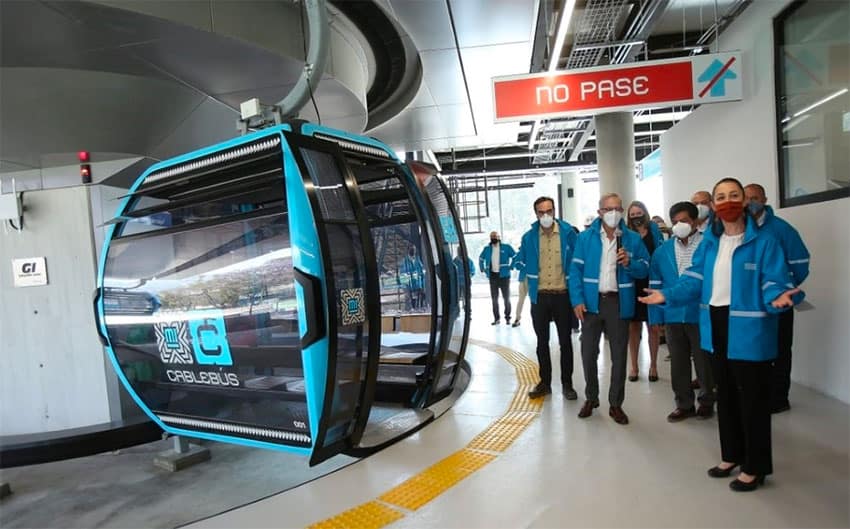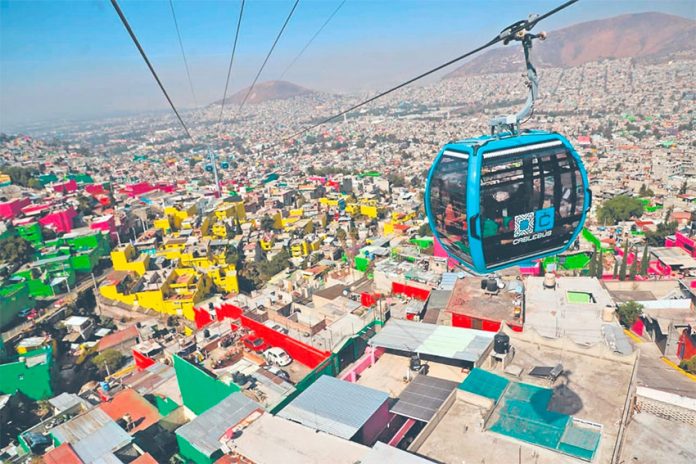The Mexico City government has opened the first section of a new cable car line in the north of the capital that officials say will cut travel time and reduce inequality.
Mayor Claudia Sheinbaum formally opened on Thursday the first leg of the Cablebús system, which will eventually link Cuautepec, a working-class neighborhood in a hilly area of the Gustavo A. Madero borough, to the Indios Verdes Metro and bus station, located some nine kilometers away in the same borough.
The 1.7-kilometer section that opened Thursday runs between the Tlalpexco and Campos Revolución stations at the Cuautepec end of the line.
The entire 9.2-kilometer stretch of the 2.3-billion-peso (US $108.1-million) line is expected to begin operations on June 20. The system will have a total of six stations and the capacity to move thousands of people per hour between Cuautepec and Indios Verdes, a journey that will take just over 30 minutes.
Each of the cars has enough room for 10 people but capacity will initially be limited to six due to the coronavirus pandemic. Some 48,000 people are expected to use the system on a daily basis.

“It’s a historic day because we’re opening a new system of collective transport, … it’s social transport,” Sheinbaum said.
“Having the best transportation for the poorest parts of the city reduces inequality,” the mayor added.
Sheinbaum said the cost of a ticket to ride the entire line has not yet been determined but pledged that the price will be accessible.
“A consultation is being carried out in the area with citizens to see how much they are willing to pay,” she said.
The mayor noted that a second cable car line is under construction in Iztapalapa, a sprawling, densely populated borough in the capital’s east.
Guillermo Calderon, director of the electrical transportation system in Mexico City, said there are almost 1 million people who live in the area around the Cablebús system.
“They [currently] make their trips [to the Metro station] in small vans that descend through narrow streets, and that may take, from the highest point [of the area] … as long as 55 minutes or an hour,” he said.
The Associated Press reported that traditional transportation solutions like bus or subway lines are almost impossible in the area because there are no rights of way in the densely packed slums, which are crowded along hillsides on steep 15-degree slopes.
Transportation Minister Andrés Lajous said the cable cars operating on the line, which runs between 63 towers, will cover five meters per second, or 18 kilometers per hour, and considerably reduce travel time between Cuautepec and Indios Verdes.
Cuautepec resident Evelyn Sánchez told the Associated Press that getting to the Metro station is currently a big challenge for her and other locals.
“It does take us a long time, and now with this … it is going to be a lot quicker,” she said.
A public transit cable car system already operates in Ecatepec, a México state municipality that borders Gustavo A. Madero, and several other Latin American cities, including Medellín in Colombia, Río de Janeiro in Brazil and La Paz, Bolivia, also use the airborne method of travel to move citizens who live in hilly areas from A to B.
